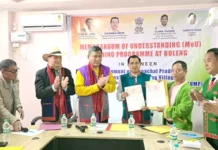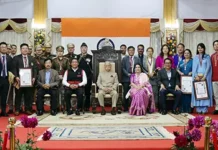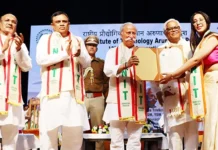Scholars, AAPSU continue to seek rectification of RGU’s ordinance
Staff Reporter
ITANAGAR, 12 Sep: Rajiv Gandhi University (RGU) has released a second ‘selected list’ for PhD courses, wherein 24 additional scheduled tribe (ST) candidates have been selected for the 31 ‘resultant vacancies’. Of these, 22 are Arunachal Pradesh Scheduled Tribe (APST) candidates.
The rest of the seven seats have been given to candidates from the general category (5), scheduled caste (1) and other backward classes – non-creamy layer (1).
As such, the number of APST candidates has also risen from 56 to 78. The total 138 PhD seats have also been increased to 169.
While the increase in the intake of APST candidates is what RGU scholars and the All Arunachal Pradesh Students’ Union (AAPSU) have been seeking, they are still of the opinion that all APST waiting list candidates could be accommodated.
Even as the RGU Research Scholars’ Forum (RGURSF) welcomed the RGU administration’s decision, it said that it is “still unsure of what parameters were used to select the candidates.”
“There is inconsistency in selection criteria in some of the departments. Apart from that, out of 31 new vacancies, only 22 were allotted to APSTs, which again is upsetting and against the meeting assurance made on 7 September. Our students did very well, got selected in unreserved categories and stood in good places even in the waiting list. However, in the second-phase admission, it is shocking to see that some SC, OBC, general category students have surpassed the merit order and got selected. As per merit, many of the APST students should have been accommodated in the resultant vacancy list too,” RGURSF general secretary Prem Taba said.
“As per reliable information, PhD seats are not exhausted in many departments. We believe that the remaining 23 APST students who were listed waiting in the first-phase result and still did not get selected in the second phase should be admitted unconditionally. This would be real justice,” he said.
Regarding the rectification of RGU’s ordinance, AAPSU general secretary Tobom Dai said, “Nothing concrete has come forthwith from RGU authorities on the ordinance. We have already submitted a memorandum for the rectification of the same on 3rd September, 2021.
We will meet with the authorities concerned in a day or two to have more clarity on our submission.”
The RGURSF also said that the rectification of “the faulty RGU ordinance is also not made certain.”
“We are demanding for an overhaul on the RGU ordinance. It should be revisited with at least 80 percent tribal faculty representation. Otherwise, in the long run, it could curtail the rights of APST students and faculty members,” said Taba.
He also pointed out that “if at all the university was so compelled to fulfil central government rules, it should also consider giving full salaries to its guest faculties. Because, as per the 7th Pay Commission and the UGC regulation, they are entitled to get salary of Rs 50,000 per month. It is already implemented in NERIST, NIT and other neighbouring universities, but RGU is yet to comply by it. Here also, most of the guest faculties are tribal. The university administration cannot simply abandon the lives of hundreds of guest faculties here.”
The scholars also appealed to all civil society organizations, student bodies, political parties, political leaders, the state government and those in influential positions, like union minister Kiren Rijiju, MPs Tapir Gao and Nabam Rebia, Chief Minister Pema Khandu and Chief Rector of RGU-cum-Governor BD Mishra “to pursue this matter at the appropriate level, so that the future of thousands of tribal students is guaranteed and protected, as we are not in a stage now to compete against the rest of India.”



